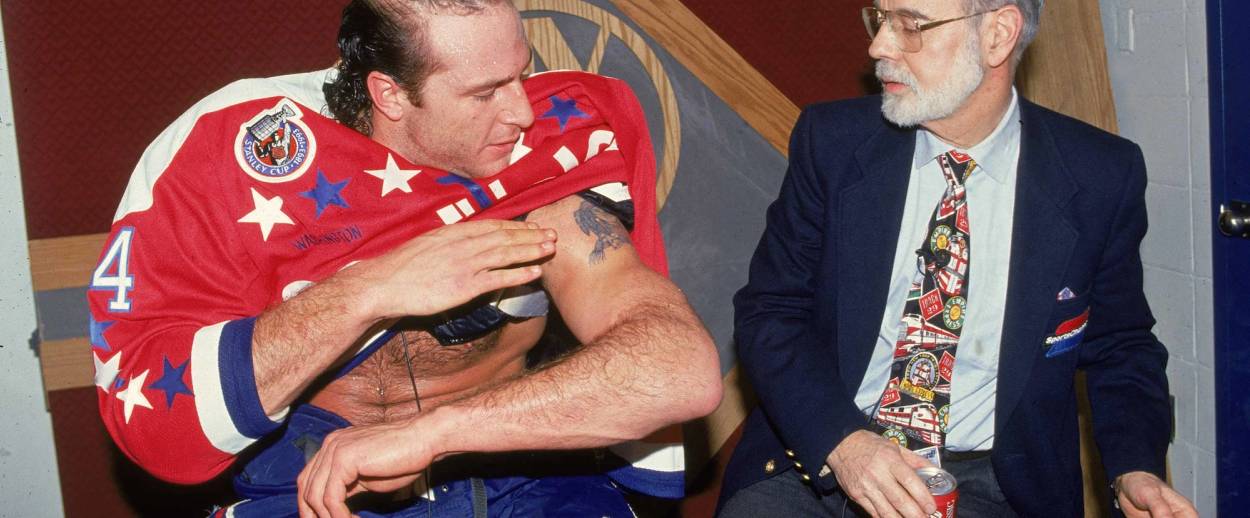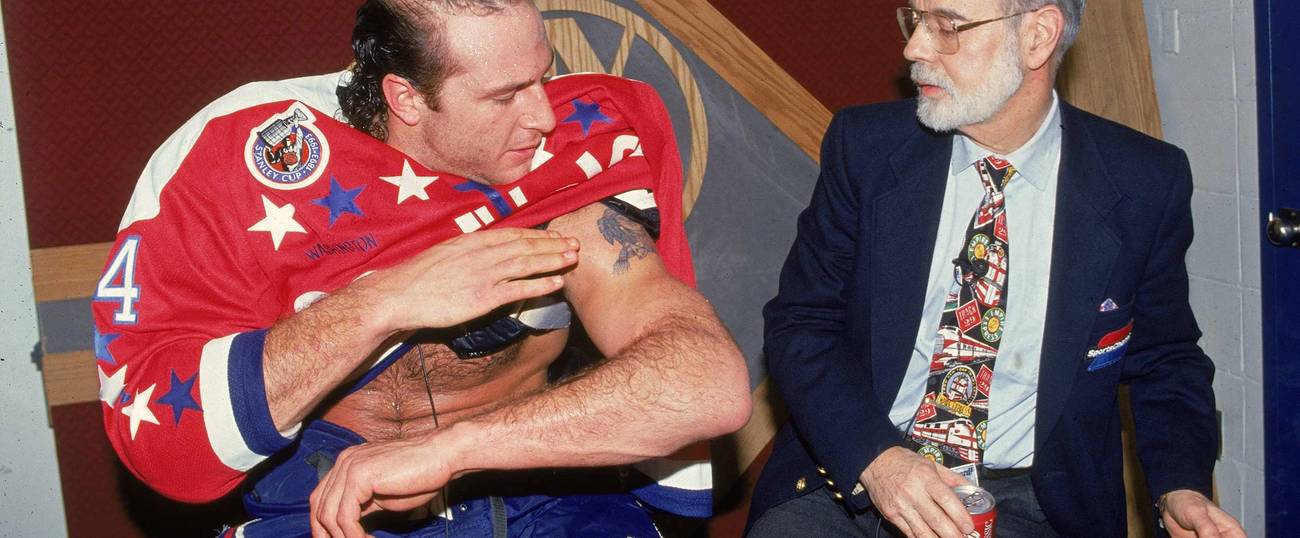Hockey Broadcasting Legend Stan Fischler Retires, Moves to the Golan Heights
As the Washington Capitals and Vegas Golden Knights vie for the 2018 Stanley Cup, the man known as The Hockey Maven leaves the sport behind—richer than he found it in 1939




The New York Islanders had just defeated Pittsburgh at Brooklyn’s Barclays Center on March 20, and I was cruising up Flatbush Avenue with broadcaster Stan Fischler; one of his interns; and Chris Riley, Fischler’s producer-colleague at MSG Networks.
A red light halted Riley at DeKalb Avenue. Fischler noted the Paramount Theatre to his right.
Working for the New York Journal-American in the mid-1950s, Fischler wrote about the theater’s manager, Eugene Pleshette. “He liked the article. He said to me he has a daughter I might like. I took her out to a hockey game. She liked hockey, but she liked hockey more than me,” Fischler deadpanned.
“Who played in the game? I don’t remember. I was too busy looking at her.”
More remarkable than Fischler’s recollection of dating actress-to-be Suzanne Pleshette was his forgetting a detail of a hockey game.
Not for nothing has Fischler long been dubbed The Hockey Maven, a living treasury of names, games, and places about a sport that first seized his passion in 1939. Indeed, Fischlers’ Hockey Encyclopedia, penned in 1975 with his wife, Shirley, a hockey pioneer in her own right, is just one of approximately 100 books The Hockey Maven—or, as he often signs emails to me, Mave—has written in more than a half century of covering the game.
At 86 but looking 20 years younger, he’s retiring after working since 1975 on New York Islanders, New York Rangers, and New Jersey Devils telecasts. Fischler now is planning what American Jewish professional athletes, coaches, team executives, owners, broadcasters—indeed, people atop any field—just don’t do.
Mave is moving to Israel.
NHL Commissioner Gary Bettman said he’ll most miss Fischler’s Friday telephone calls that begin with a joke. “I don’t even know how he remembers them,” Bettman remarked. Hockey Hall of Famer Pat LaFontaine, an Islanders center for eight seasons, advised me to tell Fischler that I know “the password: swordfish.” When I did so, Fischler pegged LaFontaine, the only player to invite him to his wedding, where the inside joke started in an inebriated state.
Fischler has met with representatives of shipping companies and of Israel’s health-care system, and has started downsizing his apartment on Manhattan’s West 109th Street and his summer home in the Catskills. His broadcasting colleague Glenn Resch, an ex-Islanders goaltender and Fischler’s longtime friend, stopped over to buy antique subway lights, a 1953 stick used by defenseman Bill Gadsby, and scrapbooks of hockey articles.
“I knew, when I walked down the hall and into the elevator, that an era was ending,” said Resch. “I sure was sad.”
Fischler’s childhood in Williamsburg; his mother Molly’s taking her only child to see the Brooklyn Dodgers; his father Benjamin’s bringing him to a New York Rovers minor-league hockey game in 1939; meeting his wife, Shirley, wearing a brown dress and working at New York University in late-summer 1967—rather than dine at a restaurant, she preferred munching hot dogs in Washington Square Park, leading him to think, “Not only is she beautiful, she’s a cheap date”; the seven Emmy Awards and the Lester Patrick Trophy for promoting hockey in the United States … those memories will lodge in life’s rearview mirror by August, when Fischler settles in the apartment he and Shirley built onto the home on Kibbutz El Rom in the Golan Heights where his son Simon resides with his wife and three children. Stan will live without Shirley in El Rom, as he must in New York. Shirley died of cancer four Mays ago.
It’s time to move.
“It’s a question of two families,” Fischler explained. “One family has been the MSG hockey group I’ve been working with a long time. They’ve been a terrific support for me. On the other side is my own family. I hardly even see my kids, to spend real, good, intense time with [them].”
Said friend and ex-Devils center Bobby Holik: “He’s The Hockey Maven, but he’s also a father and grandfather. That’s normal.”
Israel has long entranced Fischler. He first visited following the Six-Day War, skipped a quarter century, then returned regularly. At an El Rom shop, he bought a mountain bike he’s pedaled across the Golan. In Manhattan, he reads an Israeli newspaper’s website at least five times daily—“I follow it more assiduously than I do the local news here,” he said. Why’s that, Stan? “Because my focus is on Israel; that’s why.”
Moving means that Fischler will miss the wedding of the Islanders’ studio host and reporter Shannon Hogan. One of Mave’s interns—who are part of his hockey family—introduced Hogan to her fiancé-to-be. Mave beams when discussing some of his ex-interns, like NHL vice presidents Frank Brown and Jessica Berman. Fischlerettes, as LaFontaine and others call them, dot NHL franchises, minor-league clubs, and newspapers. Nurturing their careers, Mave said, is “among my most proud accomplishments.”
One, Chicago Blackhawks vice president Adam Rogowin, calls Fischler “the biggest reason I am where I am today.” Fischler dispatched Rogowin to the NHL’s midtown-Manhattan office to fetch teams’ media guides rather than ordering them mailed. The errands, Rogowin posits, were “very strategic,” devised to “create a path” for him to network with league officials.
Brown told me of Fischler’s handing him Detroit Red Wings legend Gordie Howe’s telephone number in the early 1970s. Fischler needed Howe’s comment on something.
“I said, ‘I’m just a kid. Why would he talk to me?’ ” Brown said. Fischler responded, “No, you’re a member of the press.”
“It really taught me to have the courage of my convictions—that why wouldn’t he talk to me?” Brown said.
While Mave’s on-air work ends, he intends, even from Israel, to continue publishing The Fischler Report, a weekly hockey newsletter in its 25th year. He’ll work on his memoir, and spend time with his family—Mave also will visit his elder son, Ben, in Oregon twice a year—and bike across the Golan.
At the Brooklyn game, fans posed for pictures with Fischler, as ever. This time, they wished him well. At the regular season’s end, each area team honored him. In Brooklyn, two miles from his boyhood home, Fischler dropped the ceremonial first puck. He described these experiences as “like a triple-dip ice cream cone.”
There is no shortage of ice cream in Israel. Metula even has an Olympic-size hockey rink, the only one in the country. It’s hard to imagine that the Maven won’t travel there.
***
You can help support Tablet’s unique brand of Jewish journalism. Click here to donate today.
Hillel Kuttler, a writer and editor, can be reached at [email protected].